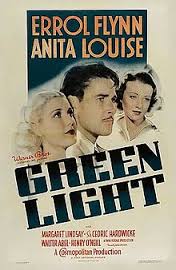
THE GREEN LIGHT
US, 1937, 85 minutes, Black and white.
Errol Flynn, Anita Louise, Margaret Lindsay, Cedric Hardwicke, Henry O'Neill, Spring Byington.
Directed by Frank Borzage.
The Green Light is adapted from a novel by Lloyd C. Douglas, author of Magnificent Obsession, White Banners, The Robe, The Big Fisherman. While Magnificent Obsession had been successfully filmed in the '30s, the main Douglas films were to emerge in the '50s. This is a more modest production. It is one of Errol Flynn's earliest films, coming soon after his success in Captain Blood. He gets sympathetic support from Anita Louise and Margaret Lindsay. Cedric Hardwicke plays a radio and pulpit preacher, stricken by polio, but speaking in the typical '30s other-worldly Christian piety. The film is melodramatic, highlights the self-service of doctors with integrity. It has dated considerably, but, of its kind, it is an enjoyable preaching melodrama.
1. Popular entertainment? The medical profession? Personal crises?
2. The work of Lloyd Douglas? His background as a preacher? Medical background? A popular combination of both? Themes of medicine, healing, personal integrity, religion, the questioning of religion?
3. The production values: black and white photography, Errol Flynn as star? The atmosphere of hospitals? The atmosphere of the Rockies and medical research?
4. The title and the meaning given it by Dean Harcourt, the challenge and the impetus to go ahead? The visual use of the traffic lights as the green light symbol?
5. The focus on Newell Paige: Errol Flynn and his style, his dedication to his work, his relationship with Frances Ogilvie and her devotion to him? Mrs. Dexter and his talks with her? His respect for her religious beliefs? The encounter with Dean Harcourt? The urgency of the operation, Dr. Endicott failing to arrive? His decision to go ahead with the operation, the failure, Mrs. Dexter's death? His silence and accepting responsibility? The confrontation with Dr. Endicott? The medical judgments on him? His being supported by Frances? The chance encounter with Phyllis Dexter, his being introduced as Mr. Walker, her attraction towards him? The outings, sympathy? The drive, the dog Sylvia, her realisation of the truth and her rejection of him? His discussions with Dean Harcourt? His leaving, travelling to trick, Rockies, the encounter with John Stafford and his research? The difficulties with Spotted Fever, his contracting the disease? Phyllis and Frances coming to him, Dr-Endicott? helping, John Stafford helping? His triumph over the illness? A typical hero of this kind of '30s novel and film? Unreal - but attractive to audiences? For understanding the issues?
6. Frances Ogilvie as a fine nurse, her devotion to Paige, her helping him in the operation, her criticism of Dr. Endicott, her allowing Paige his freedom and silence? The visit to Dean Harcourt, the encounter with Phyllis Dexter, the chance meeting with Dr. Paige and her introducing him as Mr. Walker? The dinner and Phyllis' discovery of the truth? Her going to help him in his illness? The contrast with Phyllis Dexter, in London, her devotion to her mother, her mother's death, the return, her anger at the doctors, the discussions with Dean Harcourt? The encounter with Paige, her attraction towards him? Her rejection of him? Her coming to his help, the happy ending?
7. Dean Harcourt and his contracting of polio, his determination to go on, his radio and pulpit preaching? Cedric Hardwicke's serious and pious style? The touch of the pompous other-worldliness? The response to such religion in the '30s? Later? His helping Paige, Frances, Phyllis? Their prayer in the cathedral? His allowing them to be themselves? The finale with his walk from the pulpit?
8. Dr. Endicott and his concern about money, his being late for the operation, its failure, his not taking responsibility for Mrs. Dexter's death, with the Board, not blaming Paige but not exonerating him? His subsequent misery? His eagerness to come to Page's help in the Rockies?
9. John Stafford and his research, the attitudes of the researchers to the surgeons and vice versa? His going to the Rockies, people's suspicion, the Spotted Fever and its toll amongst the people in the town? Their hostilities? Dr. Paige and his visits, helping people, contracting the disease, the experiments and research for his recovery?
10. The appeal of the medical film? Audience interest and identification? The mystique of the doctor? Strengths, failures? Responsibilities?
11. Audience response to religious themes? The preacher and the appeal to positive values, positive attitudes?. The optimism of this kind of religion?